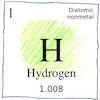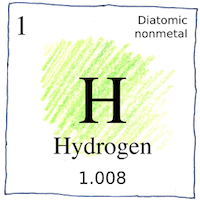London—Henry Cavendish
elements

|
Hydrogen and water
Ancient philosophers had considered water to be an element, and this mistake persisted until the seventeenth century when chemists began to discover that water had an inflammable component and that this inflammable component when mixed with air and burned produced a liquid a lot like water. Henry Cavendish was the first to show that “inflammable air” was an element and that it produces water when burned, and the first to show although he did not use the names we use, that oxygen would unite with twice its volume of hydrogen. which, as we know, is consistent with the composition of water, H2O.
Phlogistonist
Cavendish repeated the experiments of Joseph Priestley, Pierre Joseph Macquer, and others, but was most careful and thorough. It is a miracle of science that, as a phlogistonist, Cavendish’s interpretation of his findings did not diminish their importance.
Hydrogène
If I believed each element were the spirit of a god, then Hydrogène, the water-former, would command my respect. Hydrogen is the lightest and most abundant element in the universe. Hydrogen unites with oxygen to make water which assumes myriad forms— the vast and deep oceans clouds, rivers, springs, lakes snowflakes sheets of ice dew on a spider’s web and water is safe to drink.



Carl Wilhelm Scheele and Joseph Priestley discovered oxygen, but Antoine Lavoisier named it oxygène, meaning “acid-former” in Greek. Lavoisier also named Cavendish’s inflammable air hydrogène, “water-former” in Greek, because it produces water when it is burned.
It is strange that water extinguishes a fire when both of its components, hydrogen and oxygen, are highly reactive, but water seldom extinguishes a fire by smothering it; instead, the heat of the fire vaporizes the water, and the energy required for this starves the fire of the heat needed for the chain reaction.
Also a vocabulary note. In English, “inflammable” and “flammable” have the same meaning.
See also in The book of science:
Readings in wikipedia:
Other readings: